August 30, 2025

The article delineates ten essential components of a BCBA job description, emphasizing critical responsibilities, educational prerequisites, and requisite skills for Board Certified Behavior Analysts. Notably, the demand for BCBAs is on the rise, highlighting their pivotal roles in:
This underscores the necessity for both technical expertise and interpersonal skills in delivering effective behavioral analysis services. As the landscape of behavioral health evolves, how prepared are you to meet these hiring challenges? Consider leveraging Hire ABA for your recruitment needs, ensuring you secure top talent in this vital field.
The role of Board Certified Behavior Analysts (BCBAs) is increasingly recognized as vital in the field of Applied Behavior Analysis (ABA), particularly in addressing the needs of individuals with autism spectrum disorders. With the demand for these professionals projected to surge, understanding the key elements of a BCBA job description becomes essential for both aspiring analysts and employers.
This article delves into the core responsibilities, educational requirements, and essential skills that define the BCBA role, while also exploring the unique challenges faced in this dynamic profession.
What does it truly take to excel as a BCBA? How can one navigate the complexities of this rewarding career? The answers to these questions are crucial for those looking to make an impact in the field.
The bcba job description highlights that the demand for Board Certified Behavior Analysts (BCBAs) is projected to surge, with an anticipated job growth rate of approximately 22% to 23% in the coming decade—significantly outpacing the average growth rate for other professions. This increase underscores the growing recognition of Applied Behavior Analysis (ABA) as a vital intervention, particularly for individuals with autism spectrum disorders.
Board Certified Analysts in ABA are pivotal in:
In addition to direct interaction with clients, BCBAs supervise Registered Behavior Technicians (RBTs), guiding them in the execution of treatment plans while ensuring adherence to ethical standards. This collaboration is essential for delivering high-quality care and achieving optimal outcomes for clients. Furthermore, behavior analysts work alongside other professionals, such as educators and healthcare providers, to create a comprehensive support system that addresses the multifaceted needs of individuals receiving ABA therapy.
At Hire ABA, we enhance the job search experience for BCBAs by offering tailored job matching solutions that fit the bcba job description. Our advanced job fit scoring system identifies opportunities that align with your skills, preferences, and desired locations. With personalized guidance and exceptional support, we help you secure the ideal role that matches the bcba job description, enabling you to capitalize on the in the field. Are you ready to take the next step in your career? Let Hire ABA guide you toward success.
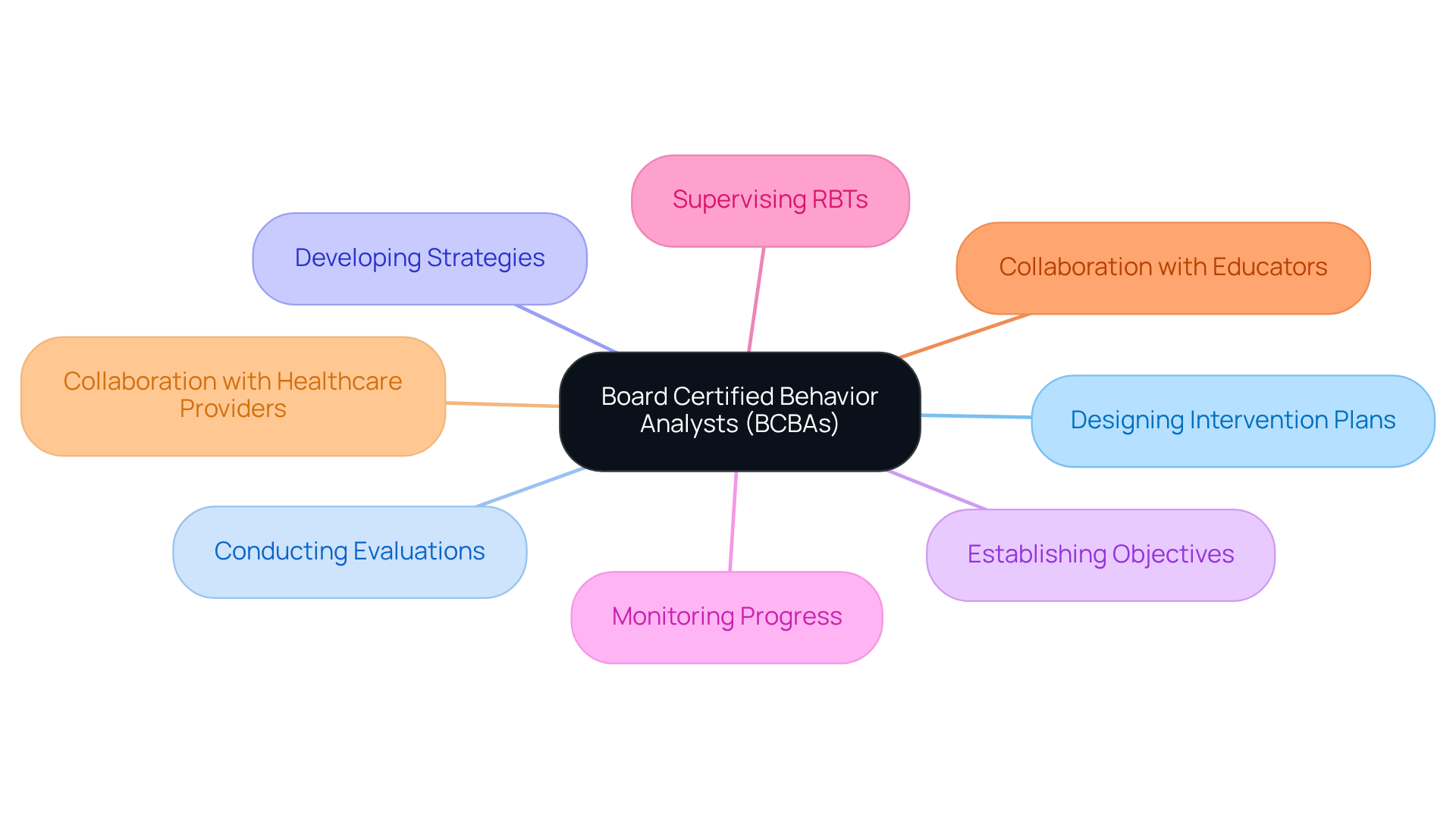
To become a Board Certified Behavior Analyst (BCBA), candidates must acquire a master's degree in behavior analysis, psychology, or a related field from a recognized institution. This educational journey typically encompasses coursework that includes essential topics such as applied behavior analysis principles, ethics, and research methodologies. As of 2025, approximately 54% of BCBAs hold a master's degree, underscoring the critical role of advanced education in this profession.
Significantly, there are more than 100 accredited master's programs in behavior analysis across the United States, including esteemed institutions like the University of Southern California and Florida Institute of Technology. Experts emphasize that a robust educational foundation is essential for effective practice in applied behavior analysis, as it equips candidates with the necessary skills to develop and implement evidence-based interventions.
Moreover, candidates must complete a minimum of 2,000 hours of supervised fieldwork to gain practical experience, ensuring they are well-prepared to meet the demands of this expanding field. Typically, it takes between 6 to 10 years to become a BCBA, reflecting the .
Additionally, BCBAs must engage in ongoing education, completing 32 continuing education units (CEUs) every two years, with at least 4 hours focused on ethics, to maintain their certification. This commitment to continuous learning is crucial in a profession that is constantly evolving.
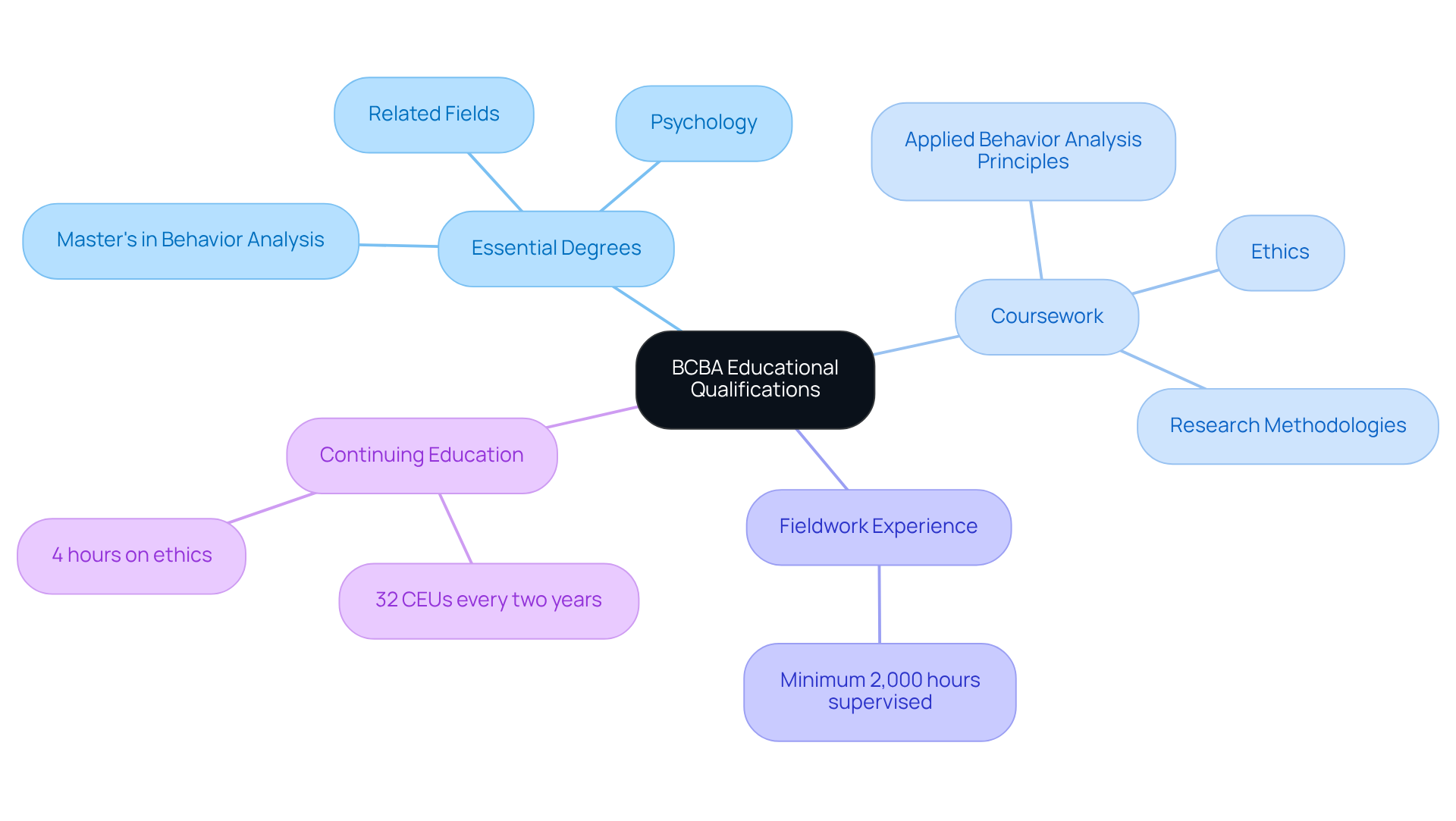
The rising demand for Board Certified Behavior Analysts (BCBAs) emphasizes the importance of the BCBA job description for qualified professionals in this field. To become a BCBA, candidates must follow the , which involves navigating a structured certification process that includes several key steps.
However, candidates often face challenges such as test anxiety and time management, which can impact their success on the exam. Once these educational and experiential requirements are fulfilled, candidates must pass the BCBA exam, which evaluates their comprehension of applied analysis principles. The BCBA job description highlights the importance of BCBA certification in guaranteeing quality assurance in analysis services and compliance with ethical standards set by the Behavior Analyst Certification Board (BACB).
As of 2025, the overall pass rate for first-time BCBA exam candidates stands at approximately 65%. This statistic reflects the importance of thorough preparation and understanding of the exam content. According to the BACB, the BCBA job description signifies that an individual has met the rigorous standards set by the BACB and possesses the necessary knowledge and skills to provide effective behavior analysis services.
Are you facing challenges in hiring qualified BCBAs? Consider how utilizing Hire ABA can streamline your recruitment process, ensuring you find the right candidates who meet these rigorous standards.
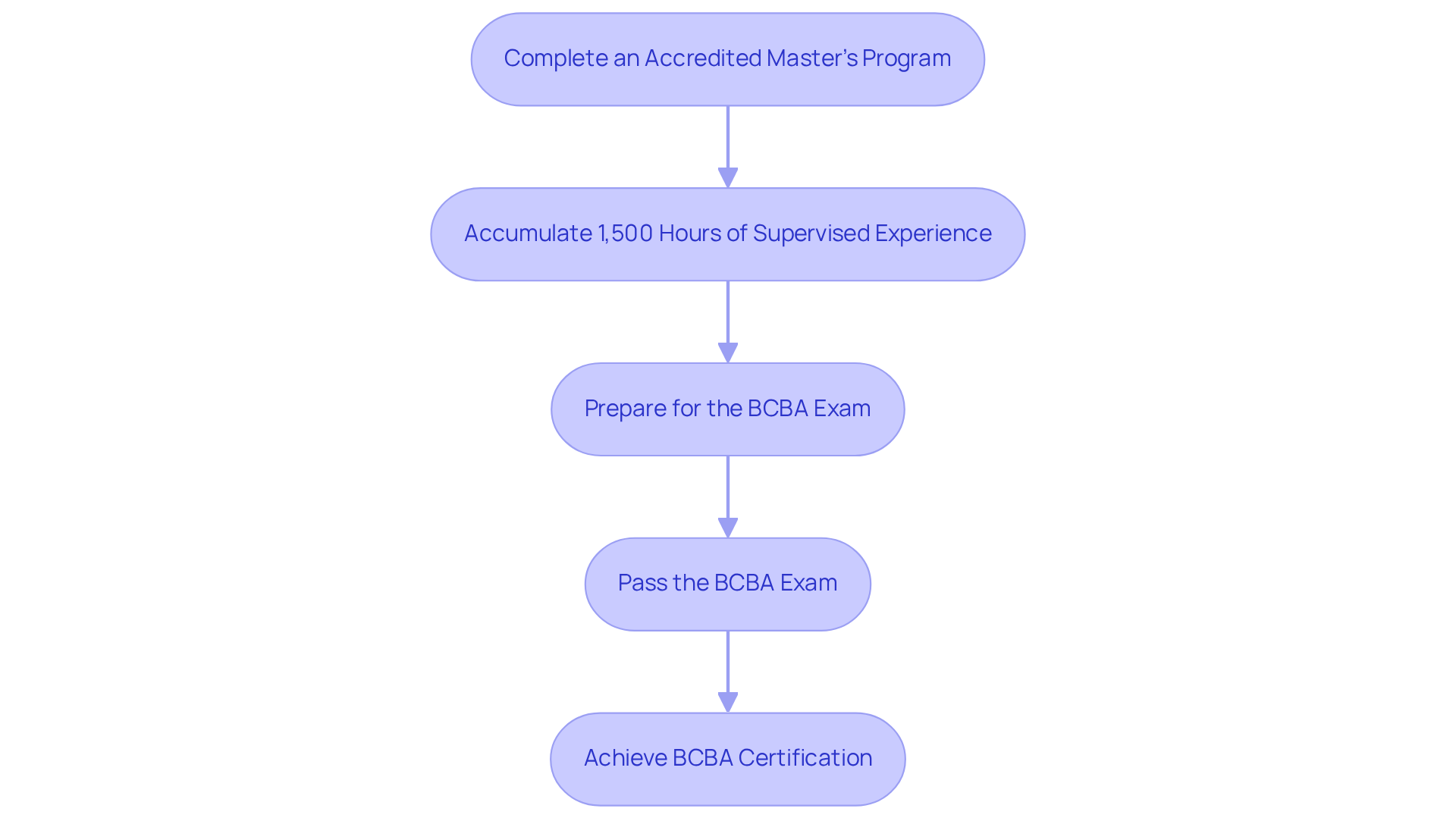
According to the bcba job description, Board Certified Behavior Analysts (BCBAs) must cultivate a balanced skill set that encompasses both hard and soft skills. Hard skills—data analysis, assessment techniques, and treatment planning—are crucial for developing effective interventions. In contrast, soft skills such as communication, empathy, and problem-solving are equally vital. These skills enable behavior analysts to engage meaningfully with clients, families, and interdisciplinary teams. Remarkably, 89% of experts in the field acknowledge the importance of soft skills investigation, underscoring their essential role in enhancing treatment outcomes and overall job effectiveness for behavior analysts.
Consider a compelling case study on improving child and family therapy through active parental engagement. It demonstrates that strong communication skills lead to enhanced therapy effectiveness and better emotional outcomes for children. This combination of skills not only elevates the quality of care provided but also fosters the . Effective communication and relationship-building are frequently linked to the bcba job description and can enhance career advancement opportunities.
Moreover, it is noteworthy that 45% of respondents indicated soft skills deficits were more common among behavior analysts. This highlights the pressing need for ongoing training and development in these areas. Are you facing challenges in hiring skilled BCBAs? Reflect on how Hire ABA can address these issues effectively.
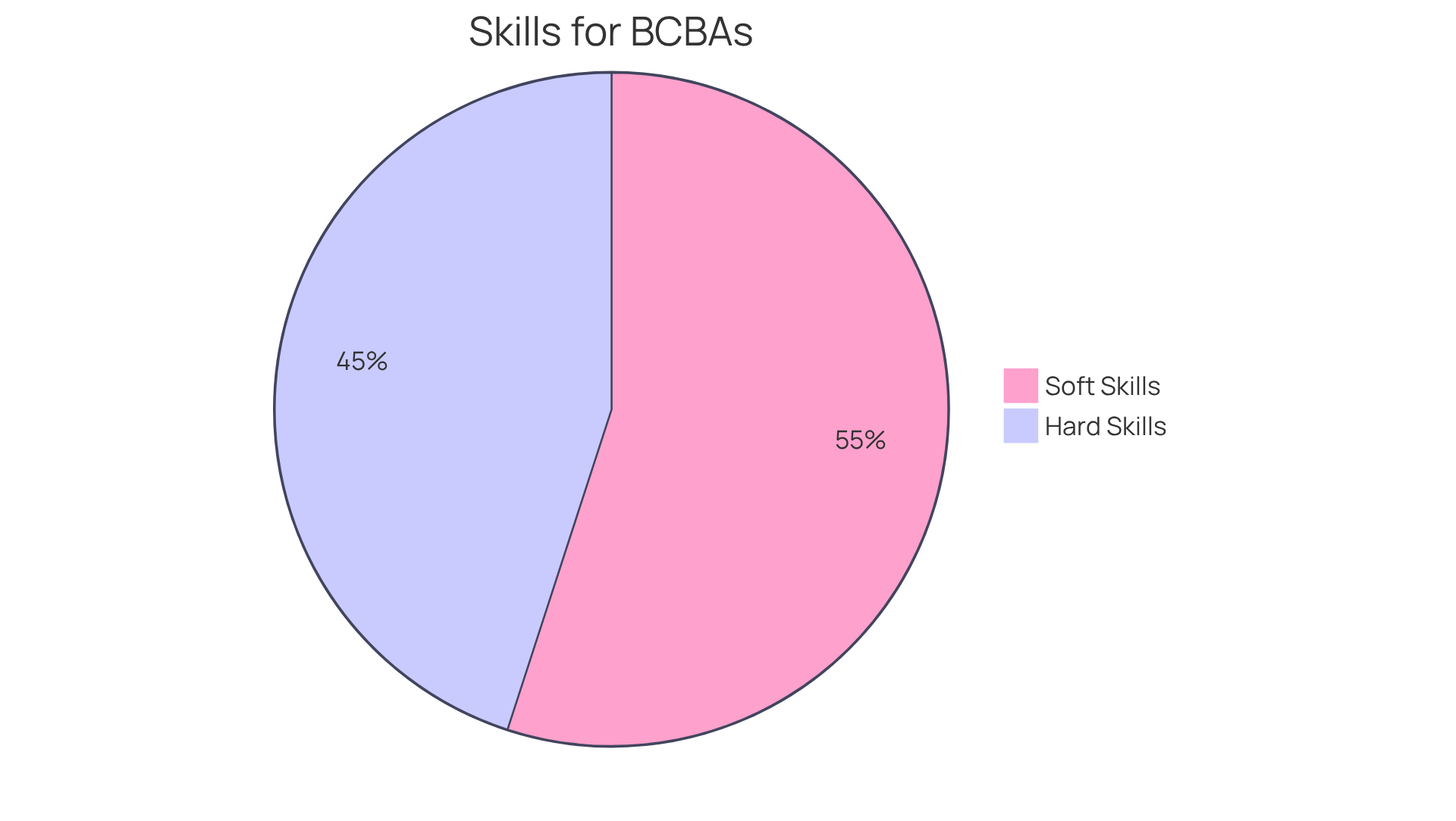
The daily responsibilities outlined in the BCBA job description encompass a vital array of tasks essential for delivering effective treatment and support to individuals. The BCBA job description includes key duties such as:
Behavior analysts also scrutinize patient data to monitor progress and make necessary adjustments to treatment strategies.
In 2025, the BCBA job description will outline that Board Certified Behavior Analysts are projected to allocate their time across several core activities:
This distribution underscores the importance of practical engagement with clients and collaboration with team members.
Behavior analysts frequently share insights regarding their responsibilities in treatment planning, highlighting the necessity for flexibility and creativity. For instance, one BCBA remarked, 'Every client is unique, and tailoring interventions to fit their specific needs is both a challenge and a rewarding aspect of my job.'
Practical examples of BCBA treatment plan execution can be observed in educational settings, where certified professionals collaborate with educators to devise support plans for students with special requirements. These plans often include strategies to and address challenging behaviors, demonstrating the significant impact board-certified professionals have on enriching the learning environment.
Overall, the BCBA job description illustrates that the role of a BCBA is dynamic and multifaceted, necessitating a blend of analytical skills, interpersonal communication, and a profound understanding of behavior analysis principles to foster positive outcomes for individuals.
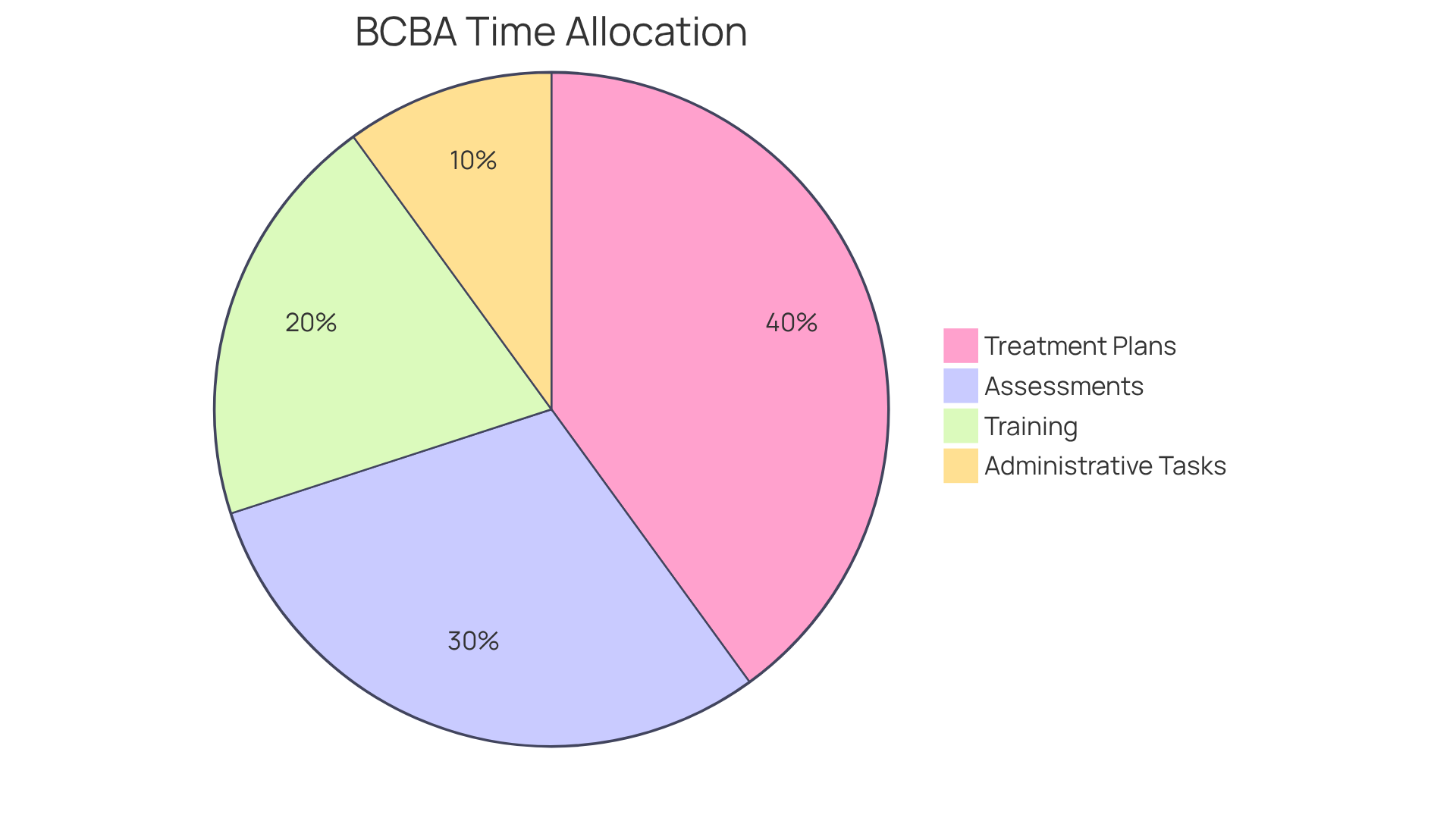
Collaboration is a cornerstone of effective ABA therapy. According to the BCBA job description, Board Certified Behavior Analysts (BCBAs) frequently engage with caregivers, teachers, and healthcare professionals to create and execute comprehensive treatment plans. This collaborative approach not only aligns all stakeholders in their strategies for client care but also cultivates a nurturing environment conducive to the client's growth and development.
Research indicates that when behavior analysts work closely with school psychologists (SPs), the likelihood of SPs implementing behavioral suggestions from behavior analysts increases significantly. This underscores the critical importance of . Furthermore, a striking 81.5% of BCBAs recognize that teamwork is an essential support element in the BCBA job description. However, it is noteworthy that 67% of BCBAs reported receiving no training in collaboration, highlighting a significant barrier to effective teamwork.
The Behavior Analyst Certification Board (BACB) asserts, "If collaboration is esteemed, our attention should be on training professionals to display effective collaborative actions, which should start at the preservice training level." Effective teamwork has been shown to enhance therapy outcomes, with families involved in collaborative networks reporting greater improvements in their children's adaptive behaviors.
Behavior analysts consistently emphasize that mutual respect and comprehension of one another's expertise are crucial for nurturing effective relationships within interdisciplinary teams. Additionally, miscommunication contributes to poor interprofessional collaboration, illustrating the challenges that must be addressed. By embracing collaboration, behavior analysts can significantly enhance the quality of care delivered to individuals, ultimately resulting in more successful therapeutic outcomes.

The rising demand for Board Certified Behavior Analysts (BCBAs) emphasizes the significance of the bcba job description in the field of behavioral analysis. The bcba job description highlights the employment of a range of assessment techniques to effectively evaluate client needs, with functional behavior assessments (FBAs) being a vital tool. FBAs involve systematic observation and analysis of actions to identify their underlying functions—be it attention-seeking, escape, or tangible rewards. This method not only informs the development of individualized treatment plans but also enhances the overall effectiveness of interventions.
Research indicates that interventions based on FBAs lead to significantly better outcomes. For instance, studies show that participants receiving treatment informed by FBAs achieve a mean reduction of 99.6% in challenging behaviors, compared to 98.7% for those without such assessments. Furthermore, ABA therapy boasts an over 89% success rate in treating children with ASD, highlighting the importance of thorough evaluations in tailoring interventions to meet specific client needs.
BCBAs utilize direct observations and standardized tests alongside FBAs to gather comprehensive data. These evaluations assist in identifying the specific reasons for actions, enabling the development of tailored treatment strategies that address the distinct challenges encountered by each individual. As Ralph Moller noted, 'Personalized treatment plans are essential for individuals with autism as they address their unique needs and challenges.' This sentiment reflects the consensus among professionals that .
In practice, the bcba job description may involve implementing various methods, including indirect assessments and structured descriptive assessments (SDA), to gather insights into individual behavior. The integration of these techniques ensures a comprehensive understanding of the individual's needs, ultimately leading to more successful therapeutic outcomes. Significantly, 66% of children referred for ABA support begin treatment and stay in services for 12 months, emphasizing the involvement and dedication to ABA assistance. Additionally, the mean interobserver agreement for functional analysis is reported at 93.8%, supporting the reliability of FBAs in practice.
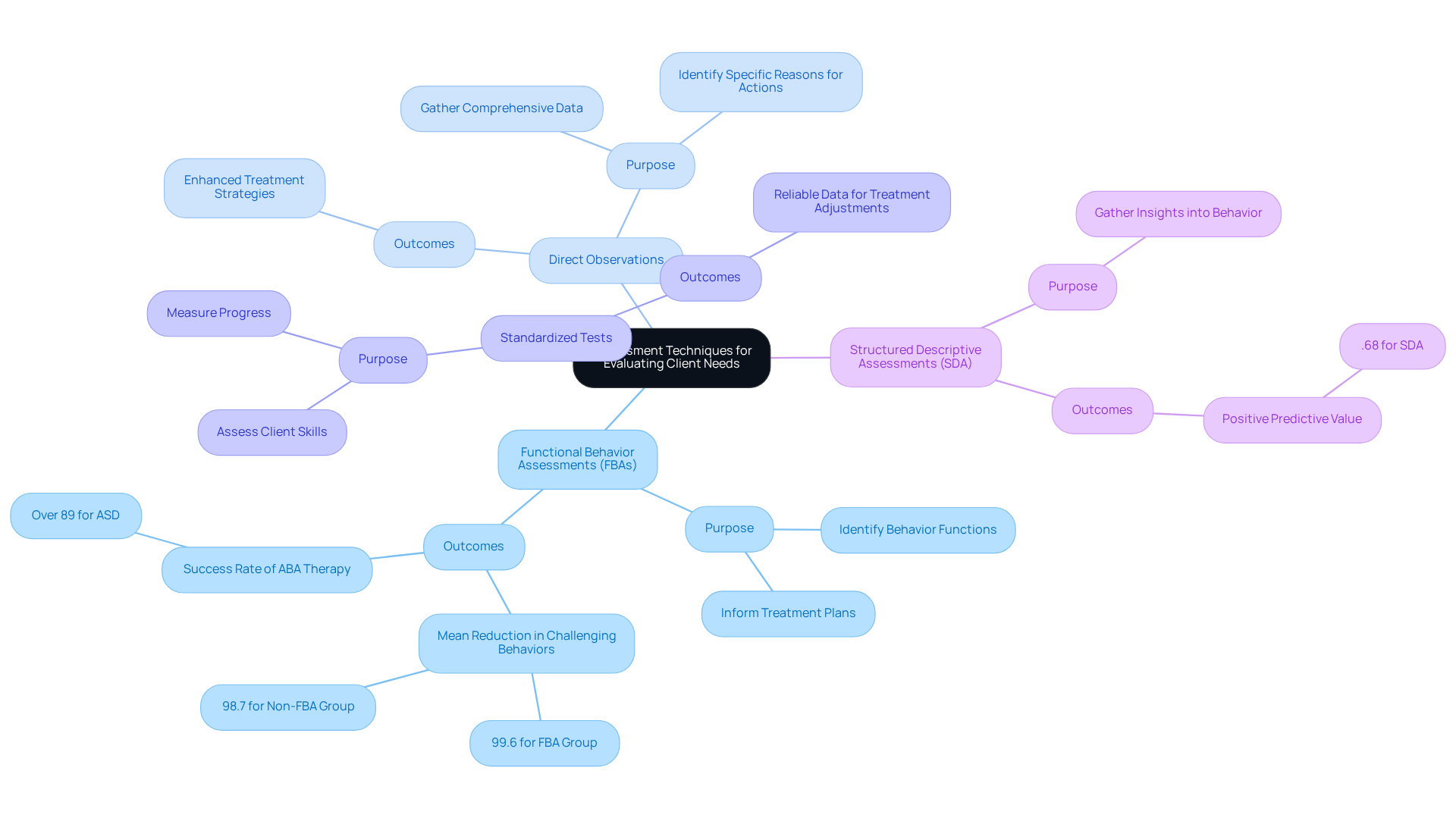
The bcba job description highlights that Board Certified Behavior Analysts (BCBAs) play a crucial role in developing personalized treatment plans meticulously crafted to meet the unique needs of each individual. These plans delineate specific objectives, strategies, and interventions, ensuring a customized approach to treatment.
Regular evaluations and modifications are integral to this process, allowing behavior analysts to adapt responsively to ongoing assessments and client progress. Research reveals that over 89% of studies indicate significant advancements in children undergoing ABA interventions, particularly when guided by certified behavior analysts. This underscores the .
Moreover, the bcba job description includes the employment of a range of assessment tools, such as:
to monitor progress and ensure that treatment plans remain pertinent and impactful. This commitment to individualized care, combined with active family involvement in therapy sessions, not only improves therapeutic outcomes but also fosters a nurturing environment for individuals, ultimately leading to substantial improvements in their daily lives.
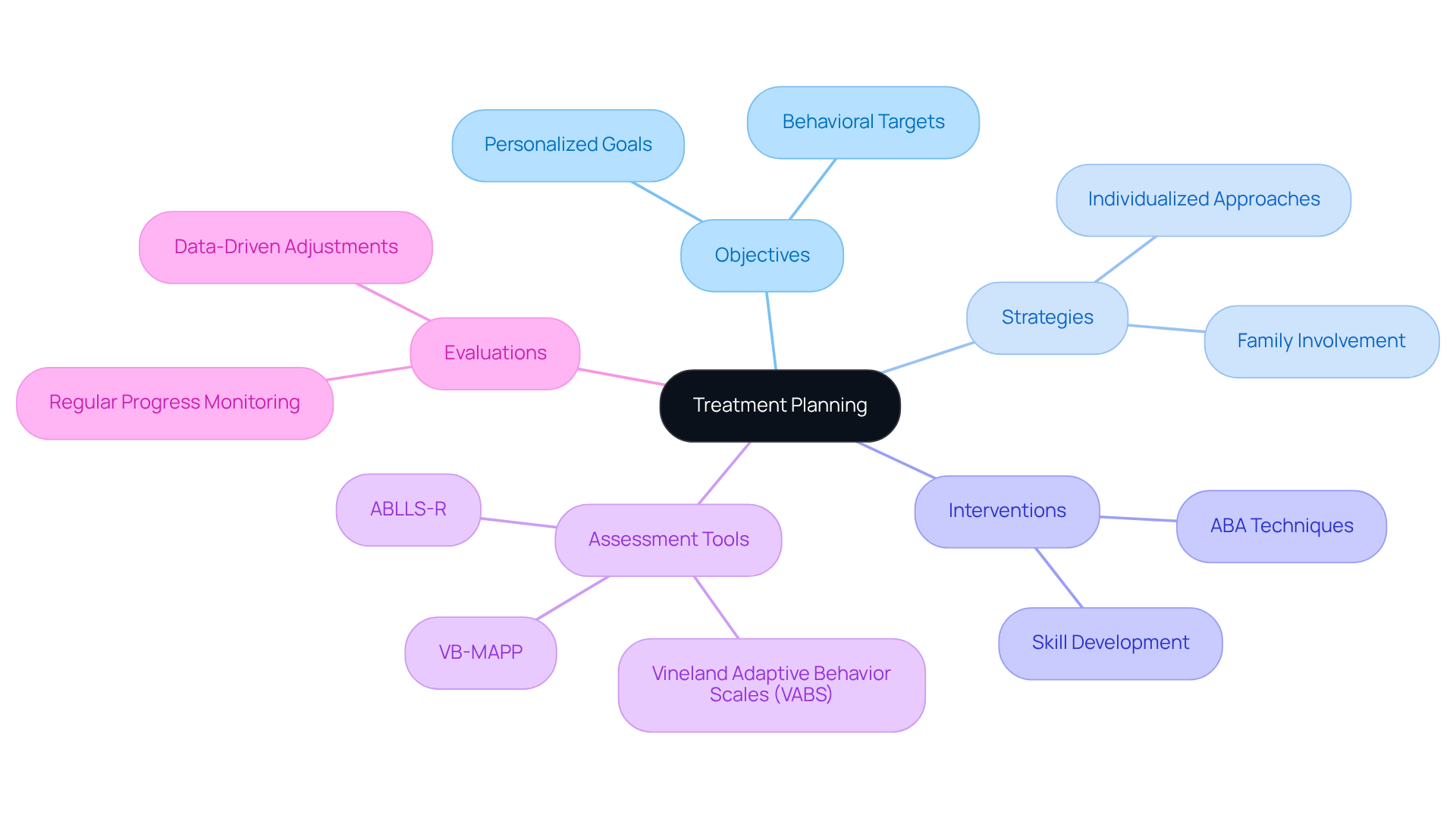
Behavior analysts play a crucial role in gathering and examining data to track progress and assess the effectiveness of interventions. With the increasing demand for Board Certified Behavior Analysts (BCBAs), the BCBA job description emphasizes the essential use of a variety of —such as frequency counts, duration recording, and interval recording. This approach ensures that treatment plans are grounded in data-driven, evidence-based practices. For instance, frequency recording tracks how often a behavior occurs, while duration recording measures the length of time a behavior lasts, providing insights into its intensity and persistence.
This systematic method enables behavior analysts to make informed choices regarding adjustments to interventions based on real-time data, ultimately enhancing outcomes for individuals. The incorporation of technology in ABA treatment further simplifies data gathering, allowing behavior analysts to record sessions digitally and assess trends effectively. As the demand for data-driven interventions grows, behavior analysts are increasingly adopting hybrid models that combine traditional methods with innovative data analytics. This shift leads to improved effectiveness of treatments and client satisfaction.
Notably, 41.8% of goals showed improvement after implementing hybrid ABA treatment models, underscoring their effectiveness. By prioritizing data management and ethical decision-making, behavior analysts not only uphold the standards of evidence-based practice but also contribute to the overall advancement of ABA therapy. As Geoffrey Moore aptly stated, 'data is absolutely crucial to making smart business decisions,' emphasizing the significance of data in the decision-making processes of behavior analysts. Are you facing challenges in hiring qualified candidates based on the BCBA job description? Consider how utilizing platforms like Hire ABA can streamline your recruitment process and ensure you have the right expertise on your team.
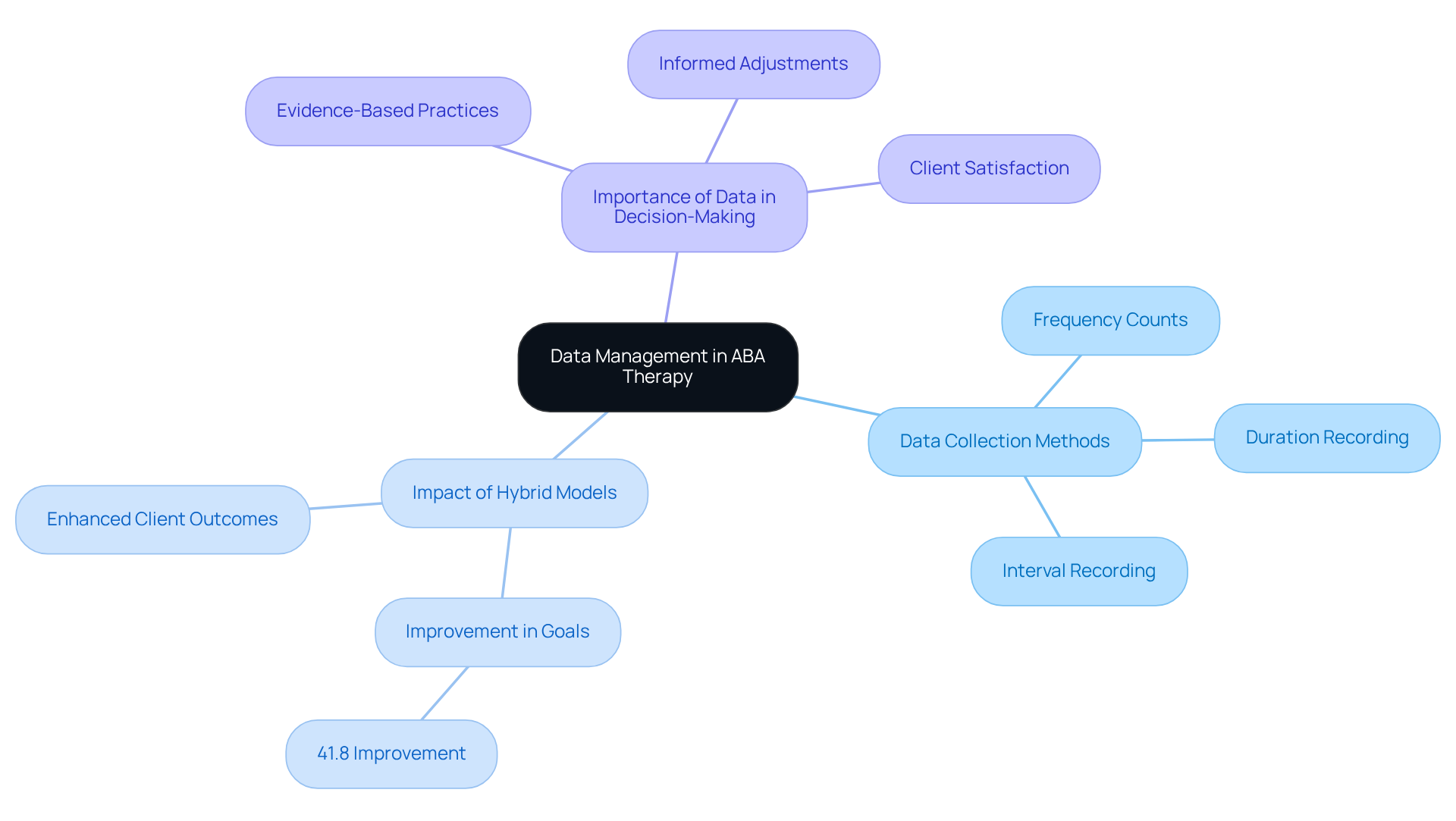
Board Certified Behavior Analysts (BCBAs) face significant challenges in their practice, including:
Navigating these complexities requires not only exceptional problem-solving skills but also resilience and effective communication with clients and their families. Ethical dilemmas are particularly prevalent; a survey indicates that behavior analysts encounter 252 ethical dilemmas that test their adherence to established ethical standards. Conflicts of interest and boundary issues are common concerns that demand careful consideration and decision-making. As Nancy E. Rosenberg aptly notes, "When faced with these dilemmas, BAs must problem solve and decide how to ethically respond."
The capacity to apply ethical principles contextually is crucial, as simplistic applications can result in inadequate solutions. With the field of ABA expanding, the likelihood of encountering such dilemmas increases, highlighting the necessity for ongoing professional development and ethical training for BCBAs, particularly in relation to the BCBA job description, especially following the issued by the BACB in 2022.
Ultimately, the effectiveness of ABA therapy—boasting an over 89% success rate in improving outcomes for children with ASD—depends on the analyst's ability to navigate these complexities while remaining committed to the best interests of their clients.
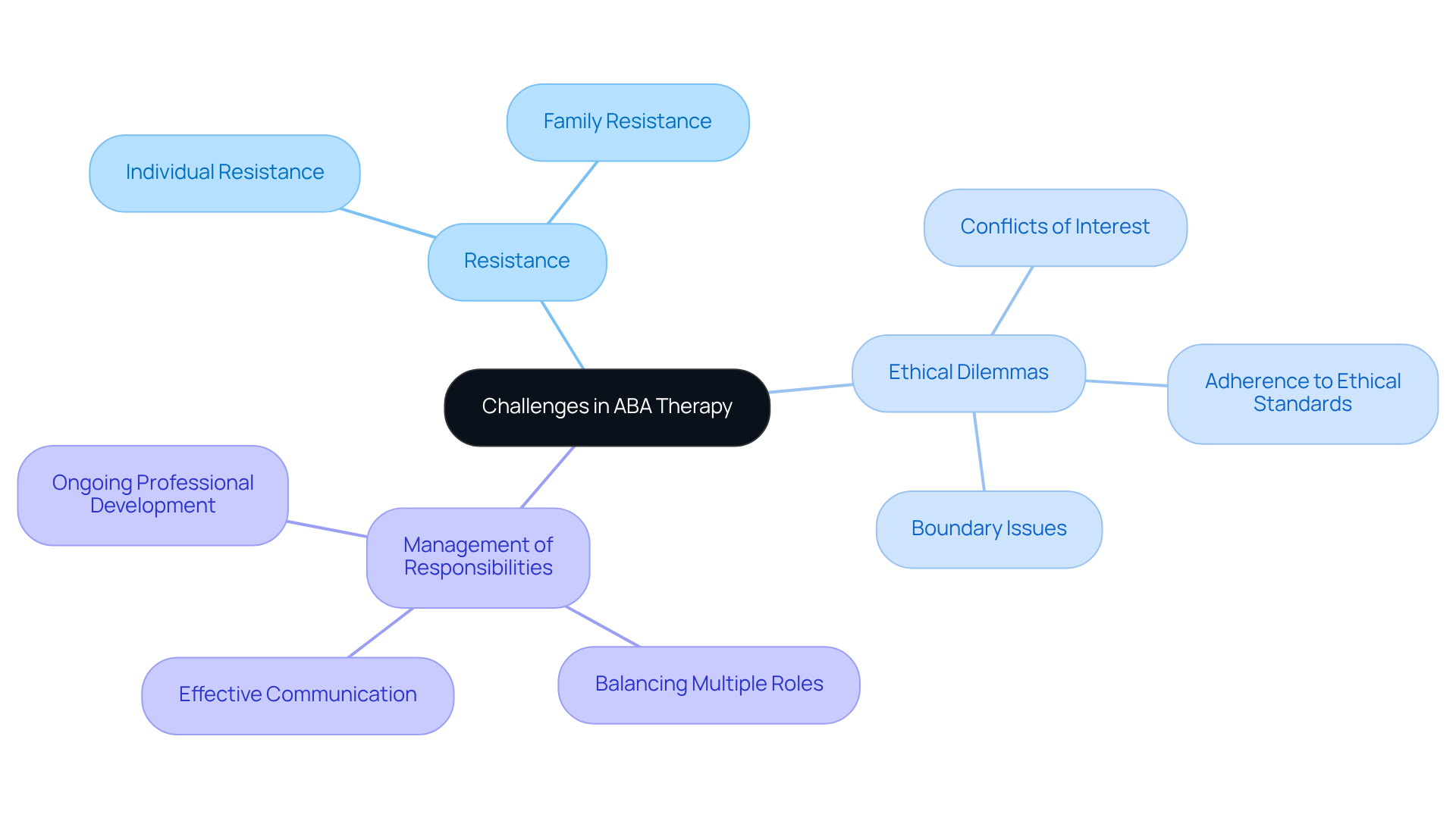
The role of a Board Certified Behavior Analyst (BCBA) is increasingly recognized as essential in delivering effective interventions for individuals, particularly those with autism spectrum disorders. With the demand for BCBAs on the rise, understanding the intricacies of the BCBA job description is crucial for both aspiring professionals and those seeking to hire qualified candidates.
Have you considered the impact that a skilled BCBA can have on your organization? Throughout this article, we have explored the key elements of a BCBA job description, including:
The importance of educational qualifications, certification processes, and the development of both hard and soft skills has also been highlighted, emphasizing the multifaceted nature of the role. Additionally, navigating challenges such as ethical dilemmas and resistance from clients underscores the need for resilience and ongoing professional development.
Ultimately, the BCBA profession plays a vital role in enhancing the quality of life for individuals receiving behavior analysis services. As the field continues to evolve, it is imperative for current and future BCBAs to embrace the challenges and opportunities that arise. By prioritizing collaboration, skill development, and ethical practice, behavior analysts can significantly impact the effectiveness of interventions, ensuring that they meet the unique needs of each client. The journey to becoming a BCBA is demanding but rewarding. With the right support and resources, professionals can thrive in this essential and impactful career.
Are you ready to take the next step in hiring a BCBA? Consider utilizing Hire ABA for your recruitment needs. By choosing a reliable platform, you can ensure that you find the right candidates who are equipped to make a difference.
What is the job outlook for Board Certified Behavior Analysts (BCBAs)?
The demand for BCBAs is projected to grow by approximately 22% to 23% in the coming decade, significantly outpacing the average growth rate for other professions.
What are the key responsibilities of a BCBA?
BCBAs are responsible for designing, implementing, and monitoring intervention plans, conducting evaluations to identify behavioral challenges, developing customized strategies, establishing personalized objectives, and ensuring effective progress monitoring. They also supervise Registered Behavior Technicians (RBTs) and collaborate with other professionals.
What educational qualifications are required to become a BCBA?
Candidates must acquire a master's degree in behavior analysis, psychology, or a related field from a recognized institution, along with completing a minimum of 2,000 hours of supervised fieldwork.
How long does it typically take to become a BCBA?
It typically takes between 6 to 10 years to become a BCBA, reflecting the commitment required for this career path.
What is the certification process for becoming a BCBA?
The certification process includes completing an accredited master's program, accumulating at least 1,500 hours of supervised experience, and passing the BCBA exam.
What is the pass rate for first-time BCBA exam candidates?
As of 2025, the overall pass rate for first-time BCBA exam candidates is approximately 65%.
What ongoing education requirements do BCBAs have?
BCBAs must complete 32 continuing education units (CEUs) every two years, with at least 4 hours focused on ethics, to maintain their certification.
How does Hire ABA assist BCBAs in their job search?
Hire ABA offers tailored job matching solutions that fit the BCBA job description, using an advanced job fit scoring system to identify opportunities that align with candidates' skills, preferences, and desired locations.
Our expert recruitment strategies and AI-driven sourcing ensure that you receive top-notch candidates quickly, without compromising on quality. Whether you’re looking for BCBAs, Clinical Directors, or RBTs, we’ve got you covered.